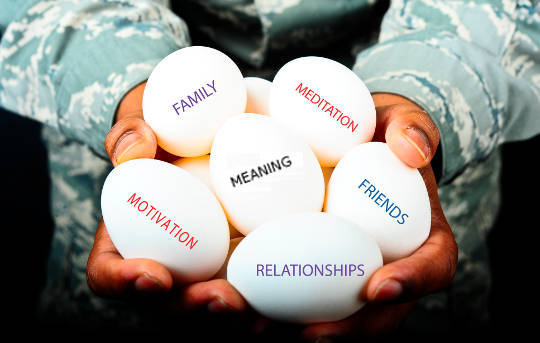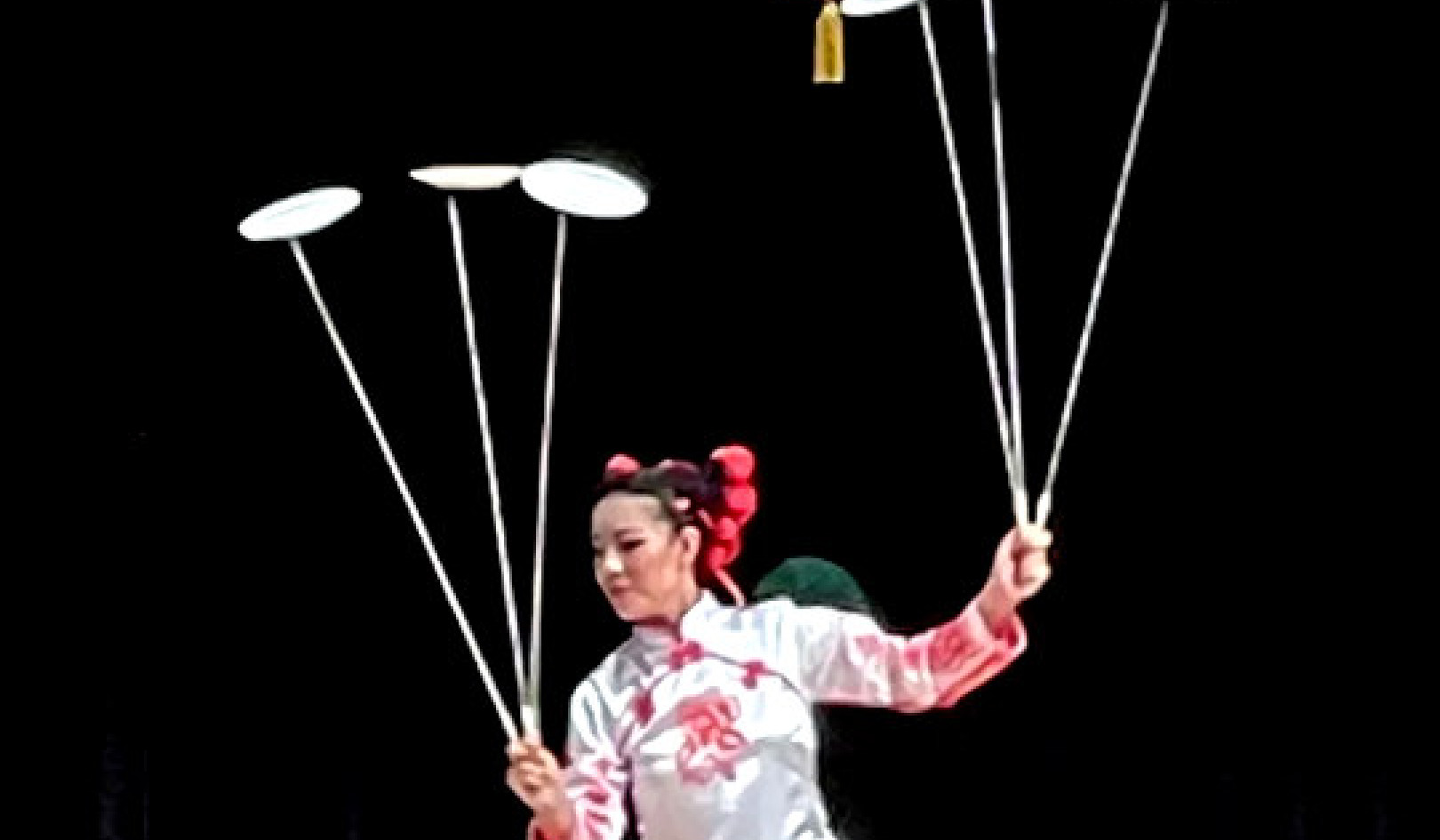
The least of things with a meaning
is worth more in life than the greatest of things without it.
— CARL JUNG
There is a deeper dimension to happiness that transcends mere joy and zest for life. A dimension that sustains and inspires us through the best of times as well as in the periods when happiness feels like a distant memory. That dimension is meaning.
Meaning supercharges our joy when life is good and keeps us moving forward when life is painful and difficult. Such transient conditions may send ripples across the surface, but meaning provides a bottomless substrate of happiness that is independent of the ebb and flow of fortune.
For many, family is the foundation that gives existence its meaning. For others, meaning comes from engaging in artistic endeavors or working to make our world a better place for all of its citizens. Still others rely on their faith in a higher power.
No matter how we define it, or where we find it, meaning is essential to a satisfying life. When we believe that what we are doing has a purpose and importance greater than ourselves, we do it with care, conviction, and passion, and we take far more pleasure in the success of our endeavors.
For Buddhists, the ultimate meaning of life is to attain enlightenment. As this highest of goals may not be achievable, or even comprehensible, within a single lifetime, Buddhism recognizes the importance of assigning relative meaning to our lives. We must each discover the purpose that speaks directly to and for us.
One of the fundamental tenets of financial planning is to “put your money where your meaning is.” In other words, we need to harness our money in service of what we consider most important. A hundred dollars spent mindfully provides far more value than a million bucks frittered away on dazzle. Once you’ve identified your meaning, you should make it the primary focus of your financial plan.
When we align our financial decisions with our values, we become “stewards” of money, not just users. It’s a rare soul who can nurture, grow, and shepherd capital so that it serves the greatest good, but it’s something to aspire to.
THE MEANING OF MEANING
The most admired figures in history — such as Jesus Christ, Rosa Parks, Gandhi, Mother Teresa, Abraham Lincoln, Harriet Tubman, and the Dalai Lama — have all been driven by a profound sense of meaning. Often, meaning-driven people do not lead what we would consider happy lives. They may be imprisoned, persecuted, or live in conditions of extreme poverty and violence. Yet something indestructible in their nature allows them to triumph over impossible odds and overcome seemingly spirit-breaking obstacles.
A life imbued with meaning isn’t just the provenance of the great. In many poor Buddhist societies, this unwavering devotion to a higher purpose allows people to be happy in the face of crippling scarcity and deprivation.
If we subtract meaning from our day-to-day existence, we humans disintegrate, no matter who we are or how comfortable our circumstances. Even folks who are quite wealthy become depressed, listless, or suicidal when they feel their lives lack meaning. Acquiring material things and achieving social status just won’t fill the void. We need a central, unifying theme to flourish.
Since meaning is the very engine of profound happiness, the search for our higher calling is not something we can afford to put off until tomorrow. Rather, we must seek out meaning every day. A purpose-driven life takes a far more satisfying trajectory than one guided by hedonistic pursuits or aimless wandering.
FINDING MEANING IN THE MODERN WORLD
For much of human history, meaning was woven into the tapestry of daily life. From birth, our ancestors tended to live reverent lives filled with ritual and tradition. And once folks reached the “fourth quarter” of life, they often became respected community elders whose job was to ensure that meaning was honored and preserved for posterity.
In many Asian cultures, it is still common for a person to renounce creature comforts and material possessions to devote their final years to God or enlightenment. But in much of our secular, youth-centric, technology-driven modern world, we no longer value tradition or honor our elders in their fourth quarter.
We are now each individually responsible for blazing our own path to meaning, with no guides and few trail markers. Should we find our way — and we must, if true happiness is what we seek — our efforts will be rewarded with the untold riches meaning offers:
* Meaning provides significance. We have a deep need to believe that what we do matters. Linking our actions to a personal “cause” informs and elevates everything we do. Mundane tasks like going to the office every day take on a significance far greater than just earning a paycheck. Living with purpose inspires us to dedicate our time, our talent, and our treasure to the world.
* Meaning motivates us. Meaning is what gets us out of bed in the morning. It answers all our big “whys.” Why am I doing this work? Why am I making this sacrifice? Why am I saving instead of spending? Without motivation, we default to what feels good right now or to what brings the least amount of pain, which gets us nowhere.
* Meaning gives us a moral compass. If life lacks meaning, there is no reason to act with integrity or do the right thing. Self-interest, habit, and fear can become our only moral rudders. Meaning provides a framework for making moral decisions.
* Meaning makes life richer. Those who discover their true calling find that life acquires a rich new flavor. A few years ago my close friend Scott became connected with PAWS, a charitable organization whose mission is to help “preserve, support, and nurture the human- animal bond.” That mission is now Scott’s mission, and PAWS is now central to his life. The people and animals he’s met have transformed him, and his volunteer work has made Scott a happier, brighter guy.
* Meaning makes us better people. Having a higher purpose lifts us up as human beings, enhances our sense of self-worth, and encourages us to become better versions of ourselves. Yoking our individual purpose to a meaningful cause calls forth our best traits. As we strive to represent that cause with integrity, we become a model for others. I have seen this very change in Scott. He’s always been a great guy, but now he’s also a leader and inspiration to others. He’s grown into the role he chose for himself.
THERE’S MORE TO LIFE THAN US
In the modern West, we may cherish the illusion that each person is an independent being, but we are immutably connected to all other creatures and things. The Buddhist concept of dependent origination holds that all beings are caused to come into existence by other beings and forces, and that all beings depend on other beings and forces for their continued existence.
A human being is born of parents and survives by breathing oxygen, which is supplied by plants, which are nourished by soil, which consists of decomposing animals, which were brought into existence by other animals, and so on. Inter dependence, not independence.
This isn’t just some esoteric theological construct. Scientists tell us that when we zoom in and look at the world very closely at the atomic level, the separation between objects disappears and all that can be seen are pulsating points of energy in a vast field of empty space, nothing distinct from anything else. We are each just a tiny facet of something much larger than ourselves.
Every human being exists on two levels: as a unique individual and as part of that larger whole. The cells of the human body illustrate this phenomenon perfectly. Each cell lives its own independent life. It eats, reproduces, defends itself, and may even move about autonomously. But each cell also serves the larger body. At a moment’s notice, it will mobilize with ten trillion other cells to help the whole body pluck a guitar string or fight an infection. The cell sustains itself, but its true devotion is to the whole. It will readily give up its life for the whole’s well-being.
In contemporary Western culture, we are trained to operate as solo cells. Strong individualism is honored, while holistic thinking is viewed with distrust. But both aspects are critical to our happiness. In order to live a fulfilled life, we must do something vital to contribute to the whole. Meaning connects us to the body human.
FINANCIAL STEWARDSHIP
If we accept that everything and everybody is connected, our entire relationship to money shifts. Money is no longer defined by what’s mine or yours. It’s no longer a tool we use to survive, care for our family, and occasionally have a little fun. We view it more like a natural resource that we must nurture and preserve for posterity. We become money’s caretaker, not its owner. Money becomes a river that widens and deepens as it grows, not just a cache of cash.
Becoming a steward of capital means that we adopt a conscious intention to use money meaningfully while we are here on Earth, and we aspire to leave a legacy that will continue to produce value even after we die. Because we don’t feel we own money, we are freer to deal with it intelligently and unemotionally. As a result, we become simultaneously more connected to money and more detached. When we’re inspired by a motive larger than self-interest, we can kick ego out of the driver’s seat and let our values drive the car. This shift ignites the prefrontal cortex of the brain, enabling us to make wiser, more mindful financial decisions that don’t just benefit our investment portfolio. They also benefit humanity.
The true litmus test for a meaning-driven life is an unwavering commitment to being a force for good in the world, even if no one acknowledges us and we know we may never see the effects of our actions. There is no more meaningful use of our money than serving others, and nobody else needs to know what we’re up to for us to reap the sizable happiness dividend that comes from paying it forward.
Meaning won’t be given to us. We must find it for ourselves. Maybe it’s this quest to find meaning that makes meaning so meaningful.
MINDFUL MONEY PRACTICE
Before you can put your money where your meaning is, you must determine your higher calling and clarify who and what matters most to you. The answer to those questions may shift over time, so use today as your starting point for an exercise you may want to revisit every year. I do.
Start by listing ten things that are very important to you, keeping in mind that those things may not be things. They may be people, projects, problems, causes, concepts, entire geographic regions, or the divine, as you define it. This list may take you a few minutes or a few hours to complete.
If you quickly list twenty things, pare them in half; if you have a hard time coming up with more than one, keep at it till you have ten. Be patient but disciplined with yourself. The search for meaning can be an arduous task.
Once you’ve listed your top ten, identify the three things on that list that mean the most to you. Draw a circle around each of them.
Finally, look for a unifying theme between your three most important items, and write down that theme. It may not be readily apparent, but I guarantee you’ll find a connection if you look long and hard enough.
To start, describe each of the three most important things separately, whether in a paragraph or a single word. Then, as you identify the connection, distill this unifying theme into a single, crystal- clear sentence. This sentence is the “meaningful purpose” that describes your life’s higher calling.
This is also the same “meaningful purpose” that you will use to guide your entire financial plan. Write it on an index card or a sticky note and keep it someplace where you will see it every single day.
©2017 by Jonathan K. DeYoe. All Rights Reserved.
Reprinted with permission of the publisher,
New World Library. www.newworldlibrary.com
Article Source
Mindful Money: Simple Practices for Reaching Your Financial Goals and Increasing Your Happiness Dividend
by Jonathan K. DeYoe.
 Is it possible to be a conscientious citizen of the world and grow wealth? The author, a Buddhist and a financial planner, says yes and explains exactly how. With a foreword by Pulitzer Prize–winner Alice Walker, Mindful Money emphasizes that money is a tool you can use to support your lifestyle, reach your goals, and earn the “happiness dividend” everyone deserves.
Is it possible to be a conscientious citizen of the world and grow wealth? The author, a Buddhist and a financial planner, says yes and explains exactly how. With a foreword by Pulitzer Prize–winner Alice Walker, Mindful Money emphasizes that money is a tool you can use to support your lifestyle, reach your goals, and earn the “happiness dividend” everyone deserves.
Click here for more info and/or to order this book:
http://www.amazon.com/exec/obidos/ASIN/1608684369/innerselfcom.
About the Author
 Jonathan K. DeYoe, CPWA, AIF, is a California-based financial adviser with twenty years’ experience and a longtime Buddhist. He bought his first stock in 1980 (he was nine years old) and he started wondering about the "Meaning of Life" in High School. He started studying finance, but quickly shifted his focus to philosophy, comparative religion and Buddhist phenomenology. He spent 7 years on those subjects before embarking on his financial career. In 2001 he founded DeYoe Wealth Management, which works with families and institutions. His blog can be found at happinessdividend.com, and you can follow him on Twitter @HappinessDiv.
Jonathan K. DeYoe, CPWA, AIF, is a California-based financial adviser with twenty years’ experience and a longtime Buddhist. He bought his first stock in 1980 (he was nine years old) and he started wondering about the "Meaning of Life" in High School. He started studying finance, but quickly shifted his focus to philosophy, comparative religion and Buddhist phenomenology. He spent 7 years on those subjects before embarking on his financial career. In 2001 he founded DeYoe Wealth Management, which works with families and institutions. His blog can be found at happinessdividend.com, and you can follow him on Twitter @HappinessDiv.
Related Books:
at InnerSelf Market and Amazon























